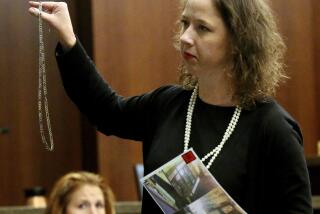An unlevel playing field
- Share via
IN DROPPING RAPE CHARGES against three Duke University lacrosse players -- while insisting that he will continue to pursue other allegations against the young men -- Durham County, N.C., Dist. Atty. Mike Nifong has further undermined his already sagging reputation for fairness.
Attorneys for David Evans, Collin Finnerty and Reade Seligmann have a vested interest in arguing that the case against their clients is now so compromised that the remaining charges also should be dismissed. Still, their argument is persuasive.
We may never know exactly what happened the night of March 13, when an African American woman hired to strip at a party for the team says she was attacked by three white students in a bathroom. What is clear is that Nifong, whose election campaign for a full term overlapped with the investigation, lost control of his tongue and participated in the transformation of this incident from a case into a cause -- usually an ominous development for the administration of justice.
There were other lapses. For example, the director of a laboratory retained by Nifong admitted that, after conferring with prosecutors, he initially decided to withhold evidence that DNA evidence taken from the woman’s body didn’t match samples submitted by the defendants or their teammates. On Friday came what should have been the fatal blow to the prosecution: the dismissal of rape charges because the woman told investigators -- last week! -- that she couldn’t be sure whether she had been penetrated by a penis, a requirement for a rape charge in North Carolina.
Yet Nifong did not dismiss other charges of kidnapping and “sexual offense,” which also could lead to significant prison time if the defendants are convicted. Nifong is entitled to his personal opinion that, as he told the Raleigh News & Observer, “a sexual assault took place” at the party. But as a prosecutor, he should bring charges to trial only if there is a likelihood of success and evidence that a jury would find credible, and we wonder if that is still possible. He may want to focus instead on how the case went off the rails.
Nifong isn’t the only one who profitably could engage in an examination of conscience. Those who seized on this case as an emblem of a “larger truth” -- a racial double standard in rape prosecutions, the historical exploitation of black women by white men, the arrogance of adolescent privilege -- did not contribute to a clarification of the factual questions that are at the heart of any criminal case. It may be true, as a Washington Post feature put it, “she was black, they were white, and race and sex were in the air.” But in a criminal case, atmosphere is no substitute for evidence.


